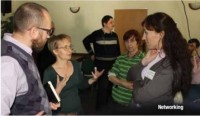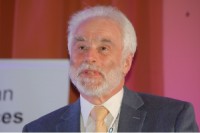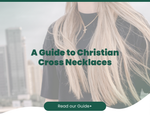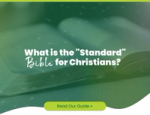Christian publishing in Russia
Together Magazine
Tony Collins reports on a recent visit he made with MAI-Europe to attend a Christian publishers conference in Russia.
We emerged from the Russian Metro, our heads spinning from the marble fascias, the bronze statues, the ceiling mosaics, the sheer scale of the Soviet-era coaches, the meticulous cleanliness. I looked around, slightly stunned: I had not expected Moscow’s centre to be so beautiful. Red Square, even at night, is just breathtaking: St Basil’s extraordinary cathedral; the long wall of the Kremlin; Lenin’s squat mausoleum; the splendid GUM superstore, its vast bulk festooned with lights.
Nicholas Gray and I were in Moscow on behalf of Media Associates International, to encourage and inform Russian Christian publishers. MAI exists to foster indigenous Christian writing and publishing around the world.
A nation of contrasts and Challenges
The Russian Christian publishing scene is, frankly, rather impressive. They battle with extraordinary challenges.
In a country of 146 million, spread across sixteen time zones, there are fewer than 1500 bookshops. Less than a dozen are Christian. Since perestroika (“restructuring”) in 1989/91 the nation has seen its international status, identity and basic assumptions about the world turned upside down and shaken. The economy has surged and flagged, as has the political infrastructure. The week we were in Moscow the Rouble dipped to 70 to the pound.
The Russian Orthodox church dominates the religious landscape. 75% of the population describe themselves as Orthodox believers, and about 13m people attend weekly liturgies. The dynamic conference convener, our friend and translator Anna Shirochenskaya, urged us to step inside an Orthodox church on the evening before we left. The golden interior rang with richmusic as the stentorian priest intoned evening worship, backed by a trio of young singers. Perhaps 40 worshippers stood to pray, mostly well-dressed business people on their way home. “Our church services will attract 2,000 on a Sunday,” Anna told me: she and her second in command, Galina, are both Orthodox believers.
The evangelical denominations are growing robustly. This presents a particular challenge, because the three million evangelical Christians of Russia have an average age of 35, and many young people, raised under a post-Soviet education system, are highly computer literate but have never acquired a reading habit.
Some of the statistics from the Russian book trade make for disturbing reading. Over the five years to 2013, print runs across Russia fell by 29%; books became 34% thinner; in 2013 45% of all the books published, by numbers of copies, were textbooks paid for by the Russian government. In this tough context, Christian book sales are tiny.
There is a further problem. In Putin’s Russia, public dissent and debate are increasingly curtailed: one of the editors at the conference told me that overt opposition to the annexation of Crimea is likely to attract a prison sentence. The Russian government is already exercising heavy control of schoolbooks: other genres may not be far behind.
Doing business in such quaking conditions is not for the faint of heart, and Russian Christian publishers are a tough bunch, pragmatic and determined. Largely established in the last 20 years, these companies sell books wherever they can, through the general shops, through churches and on line. They are quite dependent on translated material, mostly American.

Conference highlights
Which was why we were there; at a week-long conference in a solidly-built Catholic seminary on the outskirts of Moscow. Anna, a trustee of MAI-Europe, had personally spoken to each of the twelve companies represented, encouraging them to attend. Some had come far: one pair, a father and son, had travelled from Siberia. This is one measure of the need and value of such training, a phenomenon I have encountered elsewhere (at a similar course in Brazzaville, in the Republic of Congo, some participants 34had driven for four days, sleeping overnight in their cars).
Nicholas, Bible publisher and former owner of the Pickering & Inglis bookshop in Glasgow, conducted the leadership track, speaking mainly to directors, while I explored the challenges facing commissioning editors. Nicholas led sessions on increasing market share; on trends in world publishing; on working together. His group started very cautiously indeed – publishers can lack the cooperation gene – but achieved something of a breakthrough, with agreement to set up joint pages in social networks to announce new publications.
The editors met on the top storey, under the sharply angled eaves. Why, an editor asked as we sat down for our second session, would we want to publish Russian authors? We can get all the books we need, oven-ready from the States. There are not many Russian publishers, but many American books: we can pick the best. I tried to explain that each culture deserved material appropriate to its needs; that it was important evangelical churches not be regarded as alien interlopers; that (whisper it softly) not all wisdom is to be found in the US of A.
I stopped and looked round. There was a short silence. Then Roman from St Petersburg shook his head. They are too busy, our leaders. They don’t have time to write. And our customers know American writers are good.
I could see his point. If you can buy a Yancey or a Dobson, why give yourself the uncertainty and expense of developing a local author?
I have met the same attitude elsewhere, not least in Britain, where the Christian bestseller lists are firmly American in tone. Yet it is absolutely essential that the worldwide
community of Christ finds its full range of voices, just as each nation should foster its own music: harmony requires diversity. And Philip Yancey (and John Eldredge, and Bill
Johnson, and Joyce Meyer) all started as
greenhorns.
I explained about the role of the editor as hunter; the importance of finding new ideas; the need to address today’s questions; the discernment of what is ephemeral and what will last. I talked about how to spot an author. Why not hold a competition to find the best book on the Russian family? Or on the end times, proposed another: sex, family and the end of the world are popular topics. Around the circle heads nodded: a competition might work.
So I took the editors through the processes of shaping a text; I went through our contracts; I discussed the commissioning of cover designs, and the drafting of cover wordings. I spoke about setting a commercial price, and marketing, and social media, and the author as brand; about the importance of good metadata, and the structure of royalties; about the editor as Janus, one face to the author and the other to the company.
Anna had done a grand job of assembling contributors. Ian Metcalfe of Hodder & Stoughton spoke by Skype from London on the development of ebooks, with further input on the theme, again on Skype, from Vladimir Kharitonov of the Russian Digital Publishers Association: it was clearly valuable to compare the experience of West and East.
In Russia ebooks are not yet fully developed, partly because of a cavalier attitude to copyright and a rather hazy approach to Digital Rights Management: bootleg films are everywhere, and Roger Jones, of the CLC bookshop in Moscow, told me that to sell one ebook would be sufficient: Russians are very clever with computers!
Roger led a session on publisher-retailer cooperation. Roger, who is married to a Russian lady and speaks the language fluently, has trained a very able successor and he, his wife and children are preparing to return to Britain.
Robin Jones Gunn, the distinguished author and a strong supporter of MAI, contributed via DVD some important tips on the value of social media.
Psychologist and speech therapist Marina Polyakova made an impact, as she described the advance of dyslexia in the post-perestroika world: after the flood, as she
put it. Drawing upon her own considerable experience she argued that publishers have a serious responsibility to design and edit text for those many potential readers for whom a slab of grey prose is simply inaccessible. Not just a message for Russian editors.
It is a culture and market facing enormous challenges, and ongoing upheavals: it is less than 25 years since the Soviet Union collapsed, and the new officialdom is not always your friend: the careful, fair-minded bureaucracy that we complain about but take for granted has not yet become a daily reality. The suspicions of the Soviet years have receded, but may be returning; in the new Russia there are many voices competing for dominance.
Yet there are grounds for encouragement: the fiercely intelligent, educated, vigorous publishers we met; the youth and burgeoning strength of the evangelical churches; the rich tradition and lively devotion of the Orthodox faith. And, to state the obvious: it is surely a source of celebration that we were able to meet, just a few miles from Red Square, openly and candidly discussing the best ways of proclaiming Christ crucified and risen.
For more information about the work of MAI-EUROPE go to www.littworld.org or contact them at 21 Mill Street, Old Kidlington, OXFORD OX5 2EE. Tel: 01865 848337:
email [email protected].

Tony Collins is publisher of Monarch Books and Lion Fiction at Lion Hudson plc. He was on assignment for Media Associates International, the worldwide training organisation for Christian publishers and writers.
Latest Blogs

Gifts
Finding Your Symbol of Faith: A Guide to Christian Cross Necklaces
Looking for the perfect symbol of faith? Explore our guide to Christian cross necklaces, from rustic wooden designs and sturdy men's chains to elegant silver pendants.

Gifts
The Best Christian Gifts for Under £20
Looking for a meaningful gift that won't break the bank? Explore our guide to the best Christian gifts under £20, from inspiring journals to beautiful home decor.

Gift Guide
15 Confirmation Gift Ideas for Boys and Girls
Celebrating a confirmation? Discover 15 meaningful gift ideas for boys and girls, from youth Bibles and jewellery to inspiring journals and keepsakes.

Bible
30+ Powerful Quotes About the Bible (For Inspiration in 2026)
Looking for inspiration? Discover a curated collection of the most powerful quotes about the Bible, from famous historical figures to modern theologians and Scripture itself.

Bibles
What is the "Standard" Bible for Christians?
Is there an "official" Bible that all Christians use? We explain the difference between the NIV, KJV, and ESV, and help you find the standard text for your church or personal reading.

Bible
"I Keep Failing to Read the Bible" – 5 Tips to Make the Habit Stick
Do you start a Bible reading plan only to quit a few weeks later? Stop the cycle of guilt. Here are 5 psychological tips and practical changes to help you build a Bible habit that actually lasts in 2026.
